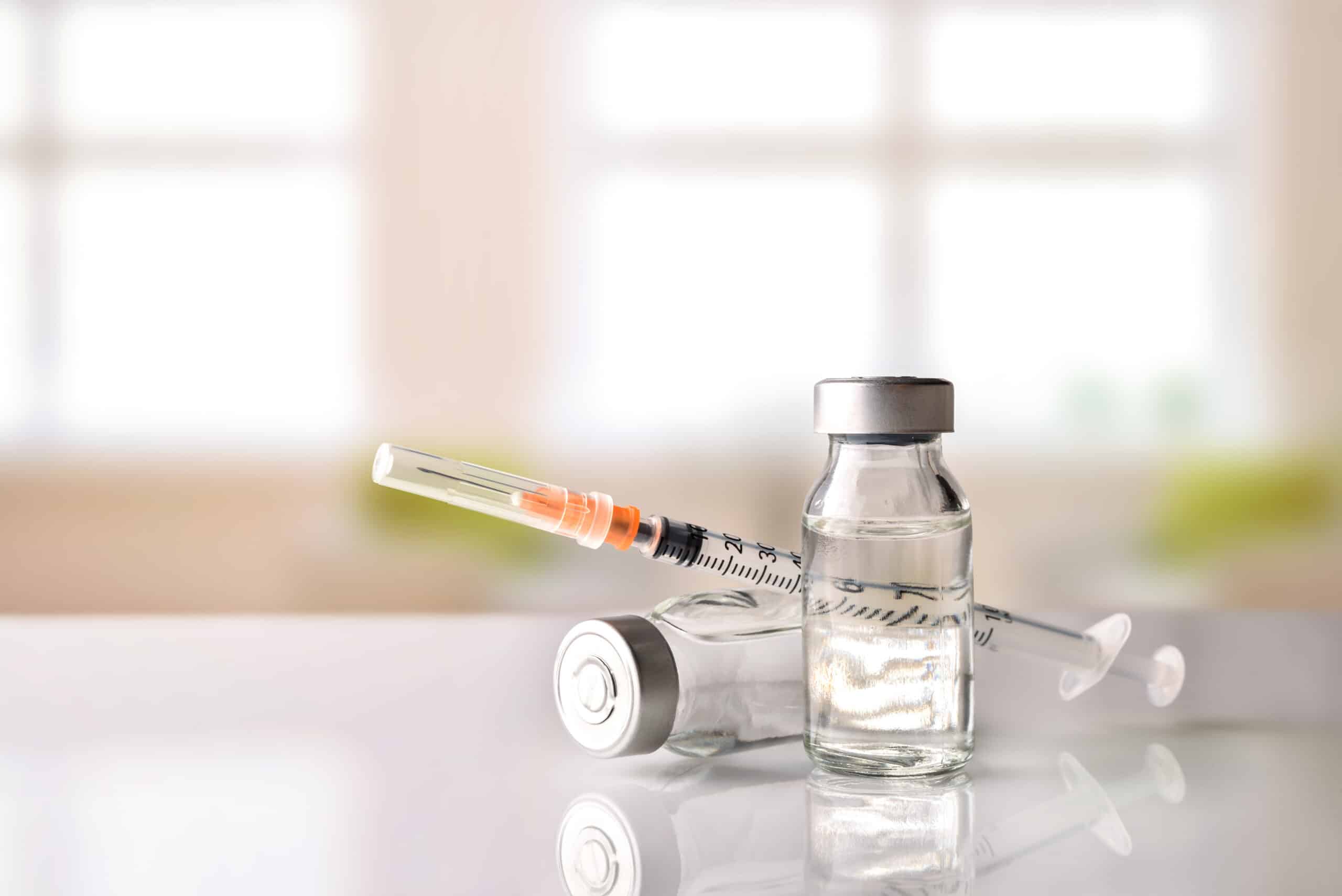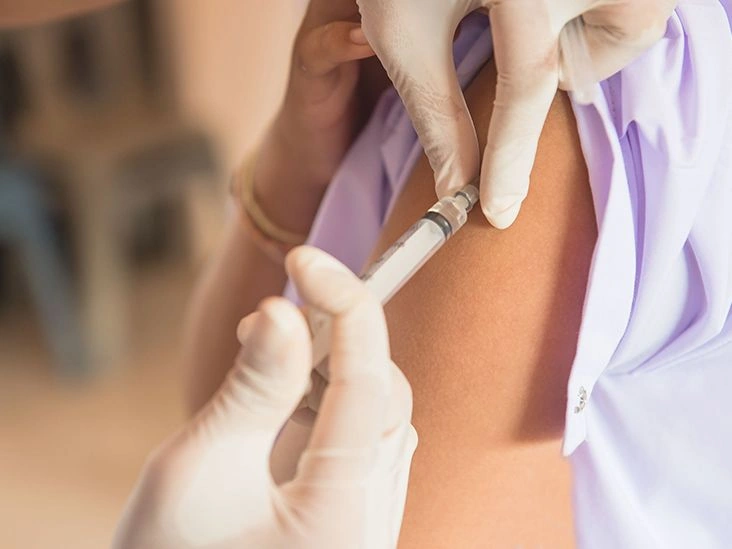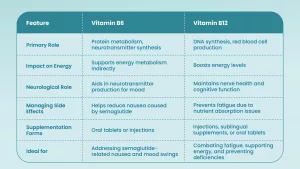Lipotropic injections deliver vitamins and nutrients that some people believe can support weight reduction. Adverse effects depend on the specific components in each injection.
These injections are dietary supplements used by individuals pursuing fat loss. They are intended to complement other elements of a weight-loss plan, such as physical activity and a calorie-restricted eating pattern.
Lipotropic compounds are nutrients, vitamins, and other active ingredients that may help stimulate metabolism and reduce or eliminate fat accumulation in the liver.
Although many clinics promote their potential for aiding weight loss, it’s important to note that only a small amount of research has evaluated the impact of lipotropic injections on losing weight.
Therefore, consult a healthcare professional before trying lipotropic injections.
Continue reading to find out how these injections are given, possible side effects and risks, and alternative weight-loss approaches that might be safer and more effective.

Ingredients in lipotropic injections
Lipotropic injections typically combine vitamins, nutrients, and branched-chain amino acids (BCAAs) that are claimed to aid weight reduction.
Vitamin B12 is the most frequently included ingredient in these mixtures.
Other commonly used components include the following. A 2013 review of research reported that these substances showed lipotropic activity in animal studies:
- choline
- inositol
- methionine
- L-carnitine
- betaine
- magnesium
- niacin
- pantothenate
- folate
Do lipotropic injections work?
Evidence is scarce regarding the effectiveness, safety, and true lipotropic actions of the ingredients used in these injections for weight loss.
Any observed impact on body weight may stem from other mechanisms or from how the components are administered.
For example, research has indicated that carnitine supplementation could have a modest effect on weight loss when combined with exercise and a nutritious diet.
Also, a 2023 study linked vitamin B12 deficiency with greater body weight and fat mass.
Dietary deficiencies can lead to low energy levels; supplementing may boost energy and exercise capacity, which in turn may increase motivation and support weight-loss efforts.
Still, very limited studies have directly investigated lipotropic injections and weight loss.
If you do see weight changes while having lipotropic injections, they are likely the result of other parts of your weight-loss program—such as diet and exercise—rather than the shots themselves.
How lipotropic injections are given
Injections are usually administered in the upper arm or other areas with more subcutaneous fat, such as the thigh, abdomen, or buttocks.
These procedures are most commonly performed in medical spas and weight-loss clinics. Providers may vary in medical training, so verify the credentials of any facility before enrolling in a lipotropic injection regimen.
Some physicians may offer single-ingredient injections, like vitamin B12, which are generally intended for individuals with documented nutrient deficiencies.
How often are lipotropic injections given?
There are no official recommendations for how frequently lipotropic injections should be given for weight loss.
Some practitioners provide them once or twice per week.
For those with vitamin B12 deficiency, a clinician might prescribe B12 injections every other day for about 2 weeks until symptoms improve.
Dosage of lipotropic injections
Doses for lipotropic injections are not standardized by the FDA, and because research is limited, few evidence-based dosing guidelines exist.
The exact amount delivered will vary depending on the specific ingredients and the clinic providing the treatment.
Practitioners often recommend weekly injections for several weeks or until a patient reaches their weight-loss objective.
Side effects and precautions
Talk with a healthcare professional about possible risks and side effects before receiving lipotropic injections.
Few studies have examined adverse effects specifically tied to injecting lipotropic agents.
However, a 2021 case report described severe skin inflammation and firm nodules at sites where choline injections were given.
Regulatory authorities have also cautioned against non–FDA-approved lipolysis injections designed to dissolve fat cells in targeted areas. Possible complications from such unapproved injections include:
- pain
- scarring
- infections
- skin irregularities
- cysts
- firm lumps
If you notice any of these problems, consult your doctor. They may advise stopping the lipotropic injections or changing the ingredients used.
Cost of lipotropic injections
There’s no single answer for the price of lipotropic injections; costs differ based on the ingredients and the provider. Online anecdotal reports suggest prices commonly fall between $35 and $75 per injection.
If administered through a medical spa or weight-loss center, injections might be offered as part of a package. Standalone injections may be less expensive in some settings.
Insurance might cover lipotropics only if you can demonstrate they’re being used to treat a medical condition. This can be difficult, as these treatments are often provided outside conventional medical settings.
Your clinic may not bill insurance directly, so you might need to pay up front and file a claim yourself.
If you lack insurance, ask the provider about payment plans or discounts for self-paying patients.
Safer, evidence-based weight-loss options
Medical organizations and researchers recommend proven, sustainable methods for healthy weight loss.
The Centers for Disease Control and Prevention (CDC) suggests aiming for steady weekly weight loss. Strategies that can help include:
- reducing daily calorie intake by about 500 calories
- following a balanced eating pattern featuring whole grains, lean proteins, low-fat dairy, fruits, and vegetables
- limiting added sugars, sodium, saturated and trans fats, and alcohol
- engaging in at least weekly moderate-intensity aerobic activity
- doing strength training at least 2 days per week
- getting adequate nightly sleep
- regularly checking in with a physician, certified trainer, or registered dietitian
Find out more about sustainable approaches to losing weight.
Frequently asked questions
How much weight can I lose in a week with lipotropic injections?
Some people report losing as much as 4 lb in a week, but no scientific studies have established how much weight can be lost with lipotropic injections alone.
Is Ozempic a lipotropic?
No. Ozempic is not a lipotropic. It is the brand name for semaglutide, a medication used to help people with diabetes control blood sugar.
Do you regain weight after stopping lipotropic injections?
There is no research specifically on weight regain after stopping lipotropic injections. However, evidence suggests maintaining regular physical activity, a balanced diet, and consistent eating habits can help prevent weight regain.
Takeaway
Lipotropic injections might promote fat reduction, but evidence for their effectiveness is limited.
They are likely beneficial only when paired with a healthy lifestyle that supports weight loss.
Although the injections are not inherently dangerous in all cases, there’s no assurance they will produce significant weight loss. Always consult a doctor before starting any injection regimen, especially if you’re already taking supplements.

























Leave a Reply
You must be logged in to post a comment.